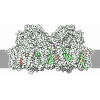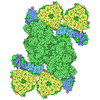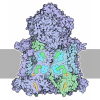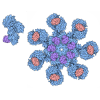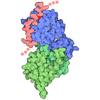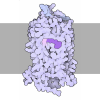+ Open data
Open data
- Basic information
Basic information
| Entry | Database: PDB / ID: 4fby | |||||||||
|---|---|---|---|---|---|---|---|---|---|---|
| Title | fs X-ray diffraction of Photosystem II | |||||||||
 Components Components |
| |||||||||
 Keywords Keywords | PHOTOSYNTHESIS / PHOTOSYSTEM / PS II / PS2 / MEMBRANE COMPLEX / TRANSMEMBRANE ALPHA-HELIX / X-RAY FREE ELECTRON LASER / PHOTOSYSTEM II / REACTION CENTER / IRON / MANGANESE / Light harvesting / electron transport / water oxidation / Thylakoid Membrane | |||||||||
| Function / homology |  Function and homology information Function and homology informationphotosystem II oxygen evolving complex / photosystem II assembly / oxygen evolving activity / photosystem II stabilization / photosystem II reaction center / photosystem II / oxidoreductase activity, acting on diphenols and related substances as donors, oxygen as acceptor / photosynthetic electron transport chain / response to herbicide / extrinsic component of membrane ...photosystem II oxygen evolving complex / photosystem II assembly / oxygen evolving activity / photosystem II stabilization / photosystem II reaction center / photosystem II / oxidoreductase activity, acting on diphenols and related substances as donors, oxygen as acceptor / photosynthetic electron transport chain / response to herbicide / extrinsic component of membrane / photosystem II / photosynthesis, light reaction / phosphate ion binding / photosynthetic electron transport in photosystem II / chlorophyll binding / plasma membrane-derived thylakoid membrane / electron transporter, transferring electrons within the cyclic electron transport pathway of photosynthesis activity / photosynthesis / respiratory electron transport chain / electron transfer activity / protein stabilization / iron ion binding / heme binding / metal ion binding Similarity search - Function | |||||||||
| Biological species |   Thermosynechococcus elongatus (bacteria) Thermosynechococcus elongatus (bacteria) | |||||||||
| Method |  X-RAY DIFFRACTION / X-RAY DIFFRACTION /  FREE ELECTRON LASER / FREE ELECTRON LASER /  MOLECULAR REPLACEMENT / Resolution: 6.56 Å MOLECULAR REPLACEMENT / Resolution: 6.56 Å | |||||||||
 Authors Authors | Kern, J. / Alonso-Mori, R. / Hellmich, J. / Tran, R. / Hattne, J. / Laksmono, H. / Gloeckner, C. / Echols, N. / Sierra, R.G. / Sellberg, J. ...Kern, J. / Alonso-Mori, R. / Hellmich, J. / Tran, R. / Hattne, J. / Laksmono, H. / Gloeckner, C. / Echols, N. / Sierra, R.G. / Sellberg, J. / Lassalle-Kaiser, B. / Gildea, R.J. / Glatzel, P. / Grosse-Kunstleve, R.W. / Latimer, M.J. / Mcqueen, T.A. / Difiore, D. / Fry, A.R. / Messerschmidt, M.M. / Miahnahri, A. / Schafer, D.W. / Seibert, M.M. / Sokaras, D. / Weng, T.-C. / Zwart, P.H. / White, W.E. / Adams, P.D. / Bogan, M.J. / Boutet, S. / Williams, G.J. / Messinger, J. / Sauter, N.K. / Zouni, A. / Bergmann, U. / Yano, J. / Yachandra, V.K. | |||||||||
 Citation Citation |  Journal: Proc.Natl.Acad.Sci.USA / Year: 2012 Journal: Proc.Natl.Acad.Sci.USA / Year: 2012Title: Room temperature femtosecond X-ray diffraction of photosystem II microcrystals. Authors: Kern, J. / Alonso-Mori, R. / Hellmich, J. / Tran, R. / Hattne, J. / Laksmono, H. / Glockner, C. / Echols, N. / Sierra, R.G. / Sellberg, J. / Lassalle-Kaiser, B. / Gildea, R.J. / Glatzel, P. ...Authors: Kern, J. / Alonso-Mori, R. / Hellmich, J. / Tran, R. / Hattne, J. / Laksmono, H. / Glockner, C. / Echols, N. / Sierra, R.G. / Sellberg, J. / Lassalle-Kaiser, B. / Gildea, R.J. / Glatzel, P. / Grosse-Kunstleve, R.W. / Latimer, M.J. / McQueen, T.A. / DiFiore, D. / Fry, A.R. / Messerschmidt, M. / Miahnahri, A. / Schafer, D.W. / Seibert, M.M. / Sokaras, D. / Weng, T.C. / Zwart, P.H. / White, W.E. / Adams, P.D. / Bogan, M.J. / Boutet, S. / Williams, G.J. / Messinger, J. / Sauter, N.K. / Zouni, A. / Bergmann, U. / Yano, J. / Yachandra, V.K. | |||||||||
| History |
|
- Structure visualization
Structure visualization
| Structure viewer | Molecule:  Molmil Molmil Jmol/JSmol Jmol/JSmol |
|---|
- Downloads & links
Downloads & links
- Download
Download
| PDBx/mmCIF format |  4fby.cif.gz 4fby.cif.gz | 1.2 MB | Display |  PDBx/mmCIF format PDBx/mmCIF format |
|---|---|---|---|---|
| PDB format |  pdb4fby.ent.gz pdb4fby.ent.gz | 1 MB | Display |  PDB format PDB format |
| PDBx/mmJSON format |  4fby.json.gz 4fby.json.gz | Tree view |  PDBx/mmJSON format PDBx/mmJSON format | |
| Others |  Other downloads Other downloads |
-Validation report
| Summary document |  4fby_validation.pdf.gz 4fby_validation.pdf.gz | 19.3 MB | Display |  wwPDB validaton report wwPDB validaton report |
|---|---|---|---|---|
| Full document |  4fby_full_validation.pdf.gz 4fby_full_validation.pdf.gz | 19.8 MB | Display | |
| Data in XML |  4fby_validation.xml.gz 4fby_validation.xml.gz | 260.8 KB | Display | |
| Data in CIF |  4fby_validation.cif.gz 4fby_validation.cif.gz | 315.8 KB | Display | |
| Arichive directory |  https://data.pdbj.org/pub/pdb/validation_reports/fb/4fby https://data.pdbj.org/pub/pdb/validation_reports/fb/4fby ftp://data.pdbj.org/pub/pdb/validation_reports/fb/4fby ftp://data.pdbj.org/pub/pdb/validation_reports/fb/4fby | HTTPS FTP |
-Related structure data
| Related structure data |  3bz1 S: Starting model for refinement |
|---|---|
| Similar structure data |
- Links
Links
- Assembly
Assembly
| Deposited unit | 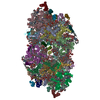
| ||||||||
|---|---|---|---|---|---|---|---|---|---|
| 1 |
| ||||||||
| Unit cell |
| ||||||||
| Details | biological unit is the same as asymmetric unit |
- Components
Components
-Protein , 2 types, 4 molecules AGVi
| #1: Protein | Mass: 38265.625 Da / Num. of mol.: 2 / Source method: isolated from a natural source / Source: (natural)   Thermosynechococcus elongatus (bacteria) / Strain: BP-1 / References: UniProt: P0A444, photosystem II Thermosynechococcus elongatus (bacteria) / Strain: BP-1 / References: UniProt: P0A444, photosystem II#16: Protein | Mass: 15148.255 Da / Num. of mol.: 2 / Source method: isolated from a natural source / Source: (natural)   Thermosynechococcus elongatus (bacteria) / Strain: BP-1 / References: UniProt: P0A386 Thermosynechococcus elongatus (bacteria) / Strain: BP-1 / References: UniProt: P0A386 |
|---|
-Photosystem II ... , 16 types, 32 molecules BNCPDQHWIaJbKcLdMeOfTgUhymXjYkZl
| #2: Protein | Mass: 56656.457 Da / Num. of mol.: 2 / Source method: isolated from a natural source / Source: (natural)   Thermosynechococcus elongatus (bacteria) / Strain: BP-1 / References: UniProt: Q8DIQ1 Thermosynechococcus elongatus (bacteria) / Strain: BP-1 / References: UniProt: Q8DIQ1#3: Protein | Mass: 50287.500 Da / Num. of mol.: 2 / Source method: isolated from a natural source / Source: (natural)   Thermosynechococcus elongatus (bacteria) / Strain: BP-1 / References: UniProt: Q8DIF8 Thermosynechococcus elongatus (bacteria) / Strain: BP-1 / References: UniProt: Q8DIF8#4: Protein | Mass: 39388.156 Da / Num. of mol.: 2 / Source method: isolated from a natural source / Source: (natural)   Thermosynechococcus elongatus (bacteria) / Strain: BP-1 / References: UniProt: Q8CM25, photosystem II Thermosynechococcus elongatus (bacteria) / Strain: BP-1 / References: UniProt: Q8CM25, photosystem II#7: Protein | Mass: 7227.559 Da / Num. of mol.: 2 / Source method: isolated from a natural source / Source: (natural)   Thermosynechococcus elongatus (bacteria) / Strain: BP-1 / References: UniProt: Q8DJ43 Thermosynechococcus elongatus (bacteria) / Strain: BP-1 / References: UniProt: Q8DJ43#8: Protein/peptide | Mass: 4410.245 Da / Num. of mol.: 2 / Source method: isolated from a natural source / Source: (natural)   Thermosynechococcus elongatus (bacteria) / Strain: BP-1 / References: UniProt: Q8DJZ6 Thermosynechococcus elongatus (bacteria) / Strain: BP-1 / References: UniProt: Q8DJZ6#9: Protein/peptide | Mass: 3974.712 Da / Num. of mol.: 2 / Source method: isolated from a natural source / Source: (natural)   Thermosynechococcus elongatus (bacteria) / Strain: BP-1 / References: UniProt: P59087 Thermosynechococcus elongatus (bacteria) / Strain: BP-1 / References: UniProt: P59087#10: Protein/peptide | Mass: 4101.911 Da / Num. of mol.: 2 / Source method: isolated from a natural source / Source: (natural)   Thermosynechococcus elongatus (bacteria) / Strain: BP-1 / References: UniProt: Q9F1K9 Thermosynechococcus elongatus (bacteria) / Strain: BP-1 / References: UniProt: Q9F1K9#11: Protein/peptide | Mass: 4299.044 Da / Num. of mol.: 2 / Source method: isolated from a natural source / Source: (natural)   Thermosynechococcus elongatus (bacteria) / Strain: BP-1 / References: UniProt: Q8DIN8 Thermosynechococcus elongatus (bacteria) / Strain: BP-1 / References: UniProt: Q8DIN8#12: Protein/peptide | Mass: 3981.673 Da / Num. of mol.: 2 / Source method: isolated from a natural source / Source: (natural)   Thermosynechococcus elongatus (bacteria) / Strain: BP-1 / References: UniProt: Q8DHA7 Thermosynechococcus elongatus (bacteria) / Strain: BP-1 / References: UniProt: Q8DHA7#13: Protein | Mass: 26851.965 Da / Num. of mol.: 2 / Source method: isolated from a natural source / Source: (natural)   Thermosynechococcus elongatus (bacteria) / Strain: BP-1 / References: UniProt: P0A431 Thermosynechococcus elongatus (bacteria) / Strain: BP-1 / References: UniProt: P0A431#14: Protein/peptide | Mass: 3878.728 Da / Num. of mol.: 2 / Source method: isolated from a natural source / Source: (natural)   Thermosynechococcus elongatus (bacteria) / Strain: BP-1 / References: UniProt: Q8DIQ0 Thermosynechococcus elongatus (bacteria) / Strain: BP-1 / References: UniProt: Q8DIQ0#15: Protein | Mass: 11655.986 Da / Num. of mol.: 2 / Source method: isolated from a natural source / Source: (natural)   Thermosynechococcus elongatus (bacteria) / Strain: BP-1 / References: UniProt: Q9F1L5 Thermosynechococcus elongatus (bacteria) / Strain: BP-1 / References: UniProt: Q9F1L5#17: Protein/peptide | Mass: 5039.143 Da / Num. of mol.: 2 / Source method: isolated from a natural source / Source: (natural)   Thermosynechococcus elongatus (bacteria) / Strain: BP-1 / References: UniProt: Q8DJI1 Thermosynechococcus elongatus (bacteria) / Strain: BP-1 / References: UniProt: Q8DJI1#18: Protein/peptide | Mass: 4191.030 Da / Num. of mol.: 2 / Source method: isolated from a natural source / Source: (natural)   Thermosynechococcus elongatus (bacteria) / Strain: BP-1 / References: UniProt: Q9F1R6 Thermosynechococcus elongatus (bacteria) / Strain: BP-1 / References: UniProt: Q9F1R6#19: Protein/peptide | Mass: 2400.951 Da / Num. of mol.: 2 / Source method: isolated from a natural source / Source: (natural)   Thermosynechococcus elongatus (bacteria) / Strain: BP-1 Thermosynechococcus elongatus (bacteria) / Strain: BP-1#20: Protein | Mass: 6766.187 Da / Num. of mol.: 2 / Source method: isolated from a natural source / Source: (natural)   Thermosynechococcus elongatus (bacteria) / Strain: BP-1 / References: UniProt: Q8DHJ2 Thermosynechococcus elongatus (bacteria) / Strain: BP-1 / References: UniProt: Q8DHJ2 |
|---|
-Cytochrome b559 subunit ... , 2 types, 4 molecules ERFS
| #5: Protein | Mass: 9449.645 Da / Num. of mol.: 2 / Source method: isolated from a natural source / Source: (natural)   Thermosynechococcus elongatus (bacteria) / Strain: BP-1 / References: UniProt: Q8DIP0 Thermosynechococcus elongatus (bacteria) / Strain: BP-1 / References: UniProt: Q8DIP0#6: Protein/peptide | Mass: 4936.704 Da / Num. of mol.: 2 / Source method: isolated from a natural source / Source: (natural)   Thermosynechococcus elongatus (bacteria) / Strain: BP-1 / References: UniProt: Q8DIN9 Thermosynechococcus elongatus (bacteria) / Strain: BP-1 / References: UniProt: Q8DIN9 |
|---|
-Sugars , 2 types, 28 molecules 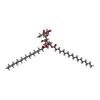
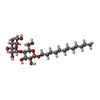

| #24: Sugar | ChemComp-DGD / #31: Sugar | ChemComp-LMT / |
|---|
-Non-polymers , 13 types, 154 molecules 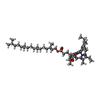

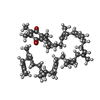
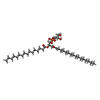
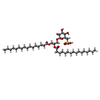
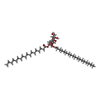


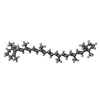
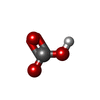

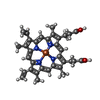













| #21: Chemical | ChemComp-CLA / #22: Chemical | ChemComp-PHO / #23: Chemical | ChemComp-PL9 / #25: Chemical | ChemComp-LHG / #26: Chemical | ChemComp-SQD / #27: Chemical | ChemComp-LMG / #28: Chemical | #29: Chemical | #30: Chemical | ChemComp-BCR / #32: Chemical | #33: Chemical | #34: Chemical | ChemComp-HEM / #35: Chemical | |
|---|
-Details
| Sequence details | CHAIN "Y" AND "k":THE DEPOSITORS KNOW THE SEQUENCE (UNIPROT ID Q8DKM3) BUT DUE TO POOR DENSITY ...CHAIN "Y" AND "k":THE DEPOSITORS |
|---|
-Experimental details
-Experiment
| Experiment | Method:  X-RAY DIFFRACTION / Number of used crystals: 2984 X-RAY DIFFRACTION / Number of used crystals: 2984 |
|---|
- Sample preparation
Sample preparation
| Crystal | Density Matthews: 3.79 Å3/Da / Density % sol: 67.58 % |
|---|---|
| Crystal grow | Temperature: 298 K / pH: 7 Details: 4% PEG 2000, 5 mM CaCl2, 100 mM PIPES, pH 7.0, batch, temperature 298K |
-Data collection
| Diffraction | Mean temperature: 298 K |
|---|---|
| Diffraction source | Source:  FREE ELECTRON LASER / Site: FREE ELECTRON LASER / Site:  SLAC LCLS SLAC LCLS  / Beamline: CXI / Wavelength: 1.323 / Beamline: CXI / Wavelength: 1.323 |
| Detector | Type: CS-PAD / Detector: PIXEL / Date: Sep 19, 2011 / Details: KB MIRRORS |
| Radiation | Protocol: SINGLE WAVELENGTH / Monochromatic (M) / Laue (L): M / Scattering type: x-ray |
| Radiation wavelength | Wavelength: 1.323 Å / Relative weight: 1 |
| Reflection | Resolution: 6.556→85.89 Å / Num. obs: 17962 / % possible obs: 98.1 % / Biso Wilson estimate: 10.83 Å2 |
| Reflection shell | Resolution: 6.5→6.73 Å / Redundancy: 2.84 % / Mean I/σ(I) obs: 6.74 / % possible all: 89.6 |
- Processing
Processing
| Software |
| |||||||||||||||||||||||||||||||||||||||||||||||||
|---|---|---|---|---|---|---|---|---|---|---|---|---|---|---|---|---|---|---|---|---|---|---|---|---|---|---|---|---|---|---|---|---|---|---|---|---|---|---|---|---|---|---|---|---|---|---|---|---|---|---|
| Refinement | Method to determine structure:  MOLECULAR REPLACEMENT MOLECULAR REPLACEMENTStarting model: PDB ENTRY 3BZ1  3bz1 Resolution: 6.56→85.89 Å / Occupancy max: 1 / Occupancy min: 0.5 / SU ML: 1.36 / σ(F): 1.48 / Phase error: 40.29 / Stereochemistry target values: ML
| |||||||||||||||||||||||||||||||||||||||||||||||||
| Solvent computation | Shrinkage radii: 0.73 Å / VDW probe radii: 1 Å / Solvent model: FLAT BULK SOLVENT MODEL / Bsol: 73.83 Å2 / ksol: 0.29 e/Å3 | |||||||||||||||||||||||||||||||||||||||||||||||||
| Displacement parameters | Biso mean: 150.17 Å2
| |||||||||||||||||||||||||||||||||||||||||||||||||
| Refinement step | Cycle: LAST / Resolution: 6.56→85.89 Å
| |||||||||||||||||||||||||||||||||||||||||||||||||
| Refine LS restraints |
| |||||||||||||||||||||||||||||||||||||||||||||||||
| LS refinement shell |
|
 Movie
Movie Controller
Controller



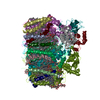
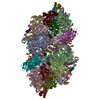
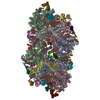
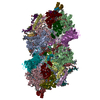
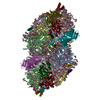
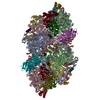


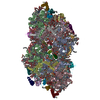
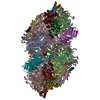
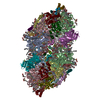
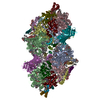
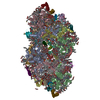

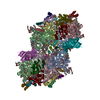
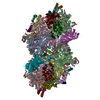
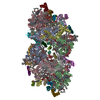
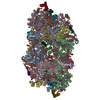
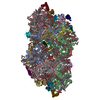


 PDBj
PDBj